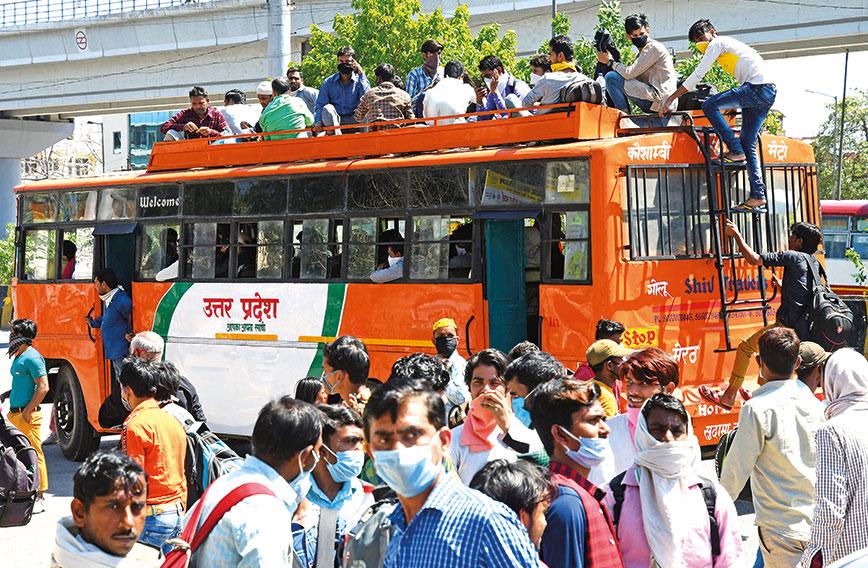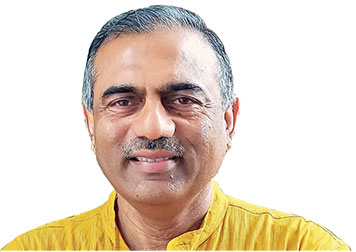
During the lockdown workers were in visible distress. It wouldn’t do to stop at immediate relief. Systemic change was needed
Upgrade shopfloors, give workers more than a job
By Rajiv Khandelwal
 WHEN the pandemic led to a nationwide lockdown, leaving millions of workers in the unorganized sector stranded in cities, several business leaders were compelled to introspect on how fairly and lawfully their workforces were being treated.
WHEN the pandemic led to a nationwide lockdown, leaving millions of workers in the unorganized sector stranded in cities, several business leaders were compelled to introspect on how fairly and lawfully their workforces were being treated.
Moved by the extreme conditions of debt, homelessness and unemployment into which workers had been pushed, there was a call, especially from the industries in the Pune belt, to voluntarily abide by labour standards and outcomes across their ecosystems.
Workers were visibly in dire straits and suffering, but it wouldn’t do to stop at the immediate relief given during the extreme crisis that the pandemic had brought with it. Systemic solutions were needed to give workers not just better terms of employment, but also to meet their aspirations and integrate them with goals of businesses. Bottom lines couldn’t any longer be defined by profitability alone, but required recognition of social justice to make long-term sense.
Thus was born the Social Compact, a voluntary coming together of industries, for which the Aajeevika Bureau and the Centre for Social Justice together with Dasra have been partnering over 60 companies and their supply chains across the country to achieve greater equity in workplaces.
“The question we asked ourselves was, ‘What do we allow our cities to become? That of extreme privilege and extreme poverty?’ It felt completely wrong. We also thought that before we point a finger elsewhere, why don’t we, as corporations, do something concrete by making life more equitable, dignified and humane for our own labour force — be it temporaries or on contract,” said Meher Pudumjee of Thermax, one of the companies that drove the idea of the Social Compact.
The Social Compact aspires to cover a workforce of one million spread across the ecosystems of 150 companies in India. A beginning has been made across Pune, Mumbai and Ahmedabad. It is a growing community of practice with 300-plus diverse participants and over 60 principal and supply chain companies on the journey towards more inclusive worker practices, triggering systemic impact for over 50,000 vulnerable workers in India.
As the Social Compact unfolds across several corporate landscapes it becomes an exciting, new example of an alternative that blends responsible internal change with sensible support to communities outside. Several leading companies are turning their gaze firmly inwards — to how their workers are treated in their commercial processes and outcomes.
Dedicated teams from the Aajeevika Bureau and the Centre for Social Justice together with Dasra have been working closely with participating companies in helping them implement Social Compact standards and provide services by deploying CSR funds.
The Social Compact is a voluntary agreement by businesses to abide by labour standards and outcomes across their ecosystems. The compact enables companies to assess their workforce practices along six powerful outcome areas and offers valuable recommendations to address systemic gaps. Using this, businesses can improve resilience and profitability, and gain a competitive edge among a fast-growing cadre of Environment, Social and Governance (ESG) investors and customers. Social Compact is a tried and trusted toolkit that gives companies a head-start on the “S” of ESG by helping them ensure more consistent and equitable worker practices through improvements in business-as-usual practices.
The way to see Social Compact is not as a CSR programme — it is a core business pursuit. With an acceptance of a compact by their companies, workers can access their legally mandated rights and entitlements. The Social Compact process begins with the adoption of a set of normative standards for dignified work, inspired by the Indian legal regime, the UN Business and Human Rights Principles, Decent Work and other internationally accepted protocols.
The standards are based on desired outcomes which include living wages for all workers, safety at workplaces and at sites, health and social security cover, grievance redressal mechanisms, gender parity in women’s work and compensation, linkage of all workers with entitlements like Aadhaar, medical insurance and PF/ESIC. The Social Compact also resolves to enable all workers to participate in the future of work through upskilling and growth opportunities.
The Social Compact journey seeks the adoption of dignified and fair working conditions for workers not only within the companies themselves, but also among their supplier ecosystems. The journey begins with a baseline for each company which documents and identifies the gaps in their labour governance systems and practices. These baselines are carried out through a management questionnaire and focus group discussions with workers, both inside the company gates as well as at the worksites of vendors within their supply chains, but always with a focus on the informal workers, who are temporarily employed with the companies themselves or with their labour suppliers/contractors as well as with smaller units in their supply chains.
While the prime movers in Pune started their internal Social Compact journeys, their CSR helped in expanding the Social Compact idea to benefit a much larger universe of workers in their catchment. Using CSR funds, Workers’ Facilitation Centres (WFCs) have been established in Chakan and Pimpri-Chinchwad industrial areas. WFCs serve as a hub for linkages and services for thousands of informal workers in these clusters. WFC teams undertake registration of workers, help workers link to social security schemes, offer legal counselling and aid to workers, facilitate ESIC advice and claims, and help with health referrals, and so on. WFCs have also started to organize skilling and employability interventions to bring the benefits of higher wages and more stable jobs to younger workers.
Through CSR, the brand name of the company lends credibility and the WFC opens access to workers of other companies. The WFC makes it possible to cover highly invisible and marginalized workers engaged in the deep supply chains of larger industries. Thanks to this initiative, several companies like Bajaj Auto, Tata AutoComp and others like them have also aligned their CSR to serving the broader worker community in these industrial areas.
A key milestone of the Social Compact has been to bring companies and NGOs into a co-solutioning relationship. By penetrating through layers of management, a strong trust-based connection has been created. There is now an opportunity to take this camaraderie and common language to CSR engagements as well. As both sides continue to understand the world and point of view of the other, the gap between them reduces.
While the Social Compact turns the gaze of social responsibility inwards, through its core request to integrate worker well-being into business as usual it also offers the opportunity for CSR to support the movement by funding the much-needed solutions that would benefit the larger worker communities. With an alignment of objectives at an overarching level, there is not only a nudge into giving more strategic space, but also to make routine interactions less tense.
While CSR may focus on the environment and communities, the Social Compact fills in the missing link of creating an emphasis on those that contribute to the business — the workers inside the factory gates, and within supply chains. It is through the coordinated tandem of business responsibility and social action that true sustainability can be ensured.
There is much that divides the very diverse community of civil society organizations. One theme that unifies many is the experience and perception of how CSR is damaging, rather than serving, the quest for sustainable and equitable development.
Numerous studies are documenting the problems inherent in corporate giving of a short-term, regimented and predefined nature that focuses stubbornly on numbers and impact but fails to address the more structural problems of development and equity. Many NGOs will report dealing with CSR departments that lack professional or experienced leadership or are guided by over-zealous committees and boards who are too remote and unfamiliar with realities.
For all its projection as a socially meaningful response, CSR remains largely driven by compliance. CSR does not really help businesses address issues within their own ecosystems. In a world where purpose is becoming a central concern, CSR for many companies remains confined to a branding exercise. Many CSR watchers are urging companies to not just sponsor social good, but also put it in practice internally. The demand is for companies to apply the highest standards of ecological and workforce practice, consumer protection and transparent governance.
Rajiv Khandelwal is co-founder of the Aajeevika Bureau
Comments
-

Dunu Roy - March 25, 2023, 12:49 p.m.
The article describes a good normative model to which the Social Compact aspires but gives no data on actual achievements , especially in bringing about a structural change in the relationship between employer ad contract worker. It, therefore, ignores the fundamental tension between employer and employee over the distribution of surpluses, and the competition between employer and employer over maintaining market shares and rates of profit. My prediction would be that this compact will fall apart . Except to the extent it offers companies a way of claiming that they have spent CSR money by providing minimal welfare benefits to workers. It won't get rid of contract work at low wages and it will not increase employment. It would be interesting to see an evaluation a year from now.





